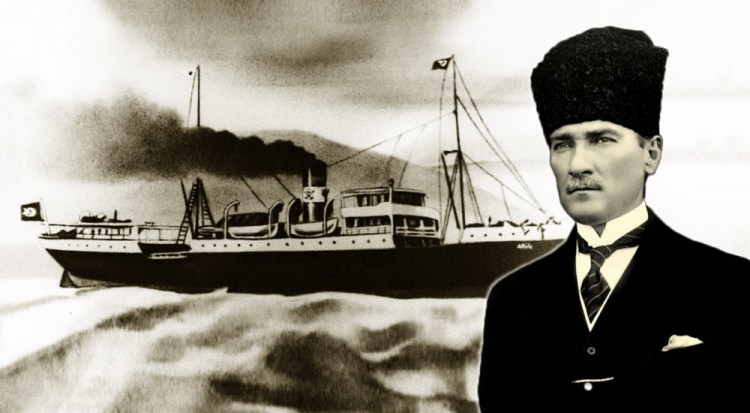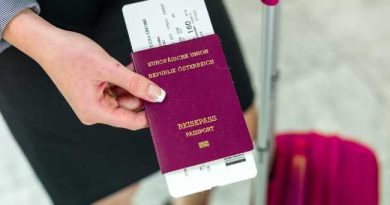British officer’s love of Ataturk: he was sent to arrest Ataturk, but surrendered to him

Retired Air Colonel Kemal Intepe tells the story of a British officer who surrendered when he went to Samsun to arrest Gazi Mustafa Kemal Ataturk, Turkey’s one-and-only ever GREAT leader.
Rahmi Turan, a prominent Turkish journalist wrote in his column in 2011 about an incident that was narrated to him by a retired Air Colonel Kemal Intepe. Based on his article, Intepe meets a British officer during his stay in UK where he goes for a flight training. The British officer tells him about the story in which he surrenders to Atatürk when he is ordered to arrest him on his arrival in Samsun where Atatürk started Turkey’s “War of Independence” against the allies (to include Greece, French and UK etc.)
KEMAL INTEPE narrates his memories as follows:
“In 1941, we went to England for flight training.
By the time we arrived in London, an elderly British Air major had been commissioned as a liaison officer. His name was Mr. Salter and he spoke Turkish better than we did.
I invited Salter and his wife for tea a few times. And he invited me to his house for dinner. One evening, retired Major Salter told me the following story:
“In 1919, as Infantry Major Salter, I was commander of the British occupation Battalion in Samsun. On 18 May 1919, I received an encrypted radio telegram from the British Occupation Forces Command in Istanbul. This Telegram said “on 16 May 1919, a Turkish General named Mustafa Kemal left Istanbul on the Bandırma Ferry, and if he landed in Samsun, he should be arrested and sent to Istanbul”.
After giving the necessary orders, I went downtown to Samsun. The city was more crowded than ever. This crowd looked different from the Sunday crowd. I noticed a lot of tough-looking people in black boots, panty pants and black calpacks (fur caps). I later learned that these were Turkish officers. The situation was very kind. Four days ago, the Greeks had invaded Izmir, and the Turks had reacted very harshly. My Greek Interpreter was terrified. All night, I couldn’t sleep.
I went to the pier early in the morning on May 19. Everyone who came out of the morning prayer had come to the shore. They were waiting for their savior. I had control of the place thanks to my soldiers.
Then a smoke appeared in the horizon. The crowd at the shore was excited. And I saw that behind each of my soldiers stood a Turkish officer in black boots and black calpacks. All of them were definitely armed.
As the steamer (BANDIRMA VAPURU) neared, I thought I couldn’t do my duty on the pier so I jumped on my boat and moved towards the vessel. I was going to arrest Mustafa Kemal Pasha there.
My boat was the first to get to the ship. Leaving the two privates I had brought with me on the boat, I climbed to the pier of the steamer with my interpreter. I said to the two crewmen who greeted me on the deck: “I want to see the general on the steamer.’
One of them showed us and led us to the door of the hall. The guard reported the situation to those inside and turned around and allowed us into the hall … everyone was standing…”
“I was surprised what to say when I came eye-to-eye with a blue-eyed, tough-looking person in the middle. As I gave a stern soldier salute, the words poured out of my mouth: “MY BATTALION IS AT YOUR DISPOSAL!”
How on earth, had I said these words? I had not even thought of such a thing before. My Greek interpreter was shocked, pausing for a moment. When I looked back at him, he immediately recovered and passed it on to the general in Turkish.
A slight smile appeared on Mustafa Kemal Pasha’s face, thanked him and took me outside.
I think I was impressed by his looks and suddenly decided to surrender. His eyes had an incredible impressive power.
Other boats had also reached the steamer, in the meantime. After Mustafa Kemal Pasha shook hands with a few people who came on board, we left the steamer on my boat.
When we arrived at the pier, I ordered my assistant to gather the battalion in the ranks and surrender all weapons to the Turkish authorities. He paused a little, then gave a soldier’s salute and left and did exactly what I ordered. The battalion surrendered to those people in black boots and black calpacks…
So when I returned to England, I was court-martialed. ‘How can a British officer fall under the command of a Turkish General? This is treason!”they were saying.”
Mr. Salter describes the continuation of the incident as follows:
“Mustafa Kemal Pasha gave me one of those soldiers in black boots, black calpack to accompany and sent me to Ankara in my own vehicle, where they said I would be hosted. I also learned soldiers of my battalion were placed in prison camps established in ÇORUM, ÇANKIRI and KASTAMONU.
I stayed in Ankara until the end of the Turkish War of independence, in a two-story wooden house located on the street in front of the Hacıbayram mosque. I lived in this house for almost four years with a woman who they said would be at my service, but who was actually my guard, and strong enough to squeeze my bones if she was annoyed. According to the agreement signed at the end of the War, I and my battalion were exchanged by Turkish prisoners in Malta.
As soon as I returned to England, I was arrested and court-martialed for treason. I was asked for a heavy prison sentence! My parents and my family who came to visit me when I was a prisoner in a military prison, brought me many newspapers and books so that I could defend myself. Making great use of them, I prepared a brief but concise defense.
The crime attributed to me was that I had surrendered my battalion without resistance. The prosecutor claimed that my surrender was a crime equivalent to treason, and he wanted me to be punished in the most severe way possible..
When I appeared before the Supreme Military Court, I read my defense in cold blood and finished with the following sentences: “Dear judges … our Prime Minister, Lloyd George, was forwarded the following question in the House of Commons:
‘Arming the Greeks, we took them to Izmir on 15 May 1919 … and since then we have made billions of pounds in expenses. What was the result? The Greeks were poured into the sea in Izmir. In addition, all the Greeks in Anatolia were expelled or forced to emigrate. In this case, what is our gain? Nothing. Is this not a mindless blunder, a terrible mistake, a great disaster?’
In response to this harsh and incriminating question, our Prime Minister, Lloyd George, gave the following answer:
“Humanity sees one or two geniuses in a century. How was I supposed to know that the genius of the 20th century would come out of Turkey under the name Mustafa Kemal?’
I said “You see, your honors… This officer standing before you at this very moment, was facing the genius of the 20th century, whom our prime minister was talking about… and at a moment he never expected, and eye to eye. What could he do? If I had acted otherwise that day, today you would have come to visit the graves of my entire battalion to include myself. But now, apart from the three of us who died of normal death, we have all returned home safely and reunited with our families. The decision belongs to your supreme justice.’* * *
“I was acquitted and demobilized. I went to Turkey with my family and visited Mustafa Kemal Pasha. Pasha greeted me with great kindness. If I hadn’t been called back to England as an officer, I would have stayed in Turkey…
When I returned to England, they took me into the Royal Air Force and gave me an important position in the Intelligence Department. I serve in a group that provides contact between Turkey and the UK.”
Retired Air Colonel INTEPE continues as follows: “Salters and I were together for more than two years. During this time, he always defended us and always considered himself one of us. He was a big fan of Atatürk.”





